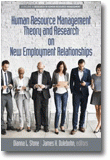
Human Resource Management Theory and Research on New Employment Relationships
Edited by:
Dianna L. Stone, Universities of New Mexico, Albany, and Virginia Tech
James H. Dulebohn, Michigan State University
A volume in the series: Research in Human Resource Management. Editor(s): Dianna L. Stone, Universities of New Mexico, Albany, and Virginia Tech. James H. Dulebohn, Michigan State University. Brian Murray, University of Dallas. Kimberly M. Lukaszewski, Wright State University.
Published 2016
This volume of the series Research in Human Resource Management (HRM) focuses on a number of important issues in HRM and OB including performance appraisal, political skill, gratitude, psychological contracts, the philosophical underpinnings of HRM, pay and compensation messages, and electronic human resource management.
For example, the first article by Cleveland and Murphy considers a very controversial issue (i.e., the reasons that organizations are abandoning the use of performance appraisal). The next article by Harris, Ferris, Summers, and Munyon is extremely interesting, and focuses on how composite political skills (e.g., social astuteness, interpersonal influence ) helps individuals develop productive work relationships in organizations. The third article by Scandura and Sharif presents a very innovative model of gratitude in organizations, and the authors argue that gratitude is essential for maintaining positive social relations in organizations.
The fourth article by Suazo and Stone-Romero provides an extremely comprehensive review of the theory and research on psychological contracts in organizations from 1960-2015. The subsequent article by Bae, Kang and Kim presents a very unique perspective on HRM, and considers the philosophical underpinnings of the field. The sixth article by Murray, Dulebohn, Roehling, and Werling presents a very innovative model to explain the role that organizational messages about changes in pay or compensation systems have on anticipatory pay satisfaction. The final article in the series by Johnson, Thatcher, and Burleson presents a thought-provoking framework for understanding the key role that information technology (IT) plays in the field of HRM.
The series should be useful to researchers and doctoral students in the fields of HRM, OB, and Industrial and Organizational Psychology. It should also be relevant for doctoral courses and scientist-practitioners in these fields.
CONTENTS
Organizational Challenges that May Prompt Changes in Human Resource Management: Theory and Research, Dianna L. Stone and James H. Dulebohn. Organizations Want to Abandon Performance Appraisal: Can They? Should They? Jeanette N. Cleveland and Kevin R. Murphy. The Role of Political Skill in Relationship Development, Work and Social Networks, and Work Effectiveness, John N. Harris, Gerald R. Ferris, James K. Summers and Timothy P. Munyon. Gratitude as a Broaden-and-Build Emotion at Work, Terri A. Scandura and Monica M. Sharif. A Review of Theory and Research on Psychological Contracts in Organizations, Mark M. Suazo and Eugene F. Stone-Romero. Human-to-Value Creation to Value-to-Human Creation: Toward a Philosophy of Human Resource Management, Johngseok Bae, Cheul Kang, and Youngshin Kim. Cognitive Response: Cognitive Structure Framework for Messaging’s Effect on Pay Attitude Formation, Brian Murray, James H. Dulebohn, Mark V. Roehling, and Stephen E. Werling. A Framework and Research Agenda for studying eHRM: Automating and Informating Capabilities of HR Technology, Richard D. Johnson, Jason B. Thatcher, and Jim Burleson.
-
Paperback9781681236940
Web price: $45.04 (Reg. 52.99)
-
Hardcover9781681236957
Web price: $80.74 (Reg. 94.99)
- eBook9781681236964

- BUS041000 - BUSINESS & ECONOMICS: Management
- BUS030000 - BUSINESS & ECONOMICS: Human Resources & Personnel Management
- BUS000000 - BUSINESS & ECONOMICS: General
-
 Diversity and Inclusion in Organizations
Diversity and Inclusion in Organizations
-
 Forgotten Minorities in Organizations
Forgotten Minorities in Organizations
-
 Leadership
Leaders, Followers, and Context
Leadership
Leaders, Followers, and Context
-
 Managing Team Centricity in Modern Organizations
Managing Team Centricity in Modern Organizations
-
 Research Methods in Human Resource Management
Toward Valid Research-Based Inferences
Research Methods in Human Resource Management
Toward Valid Research-Based Inferences
-
 The Only Constant in HRM Today is Change
The Only Constant in HRM Today is Change
-
 The Plight of Stigmatized Groups in Organizations
The Plight of Stigmatized Groups in Organizations

